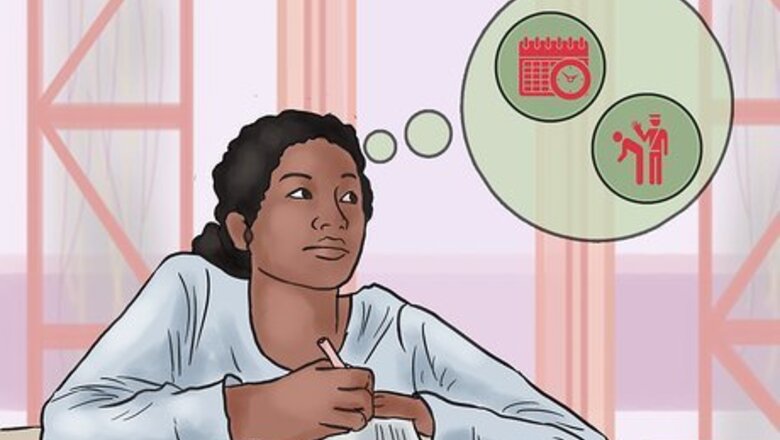
views
Investigating the Facts

Write out what happened. If you believe you were searched in violation of your Fourth Amendment rights, the first thing you should do is record your account of the search while everything is still fresh in your mind. Include as many factual details as possible in your account, including the date and time of the search and the names and job titles of school officials involved. Recount where and how the search took place – these details may make a difference in whether the search was reasonable or violated your Fourth Amendment rights. For example, if you were patted down in front of a classroom of students, a court might consider that excessively intrusive because of the embarrassment caused by you being singled out and patted down in front of your peers – even though pat-downs are generally permissible in the school setting. On the other hand, if you were called out of class and patted down in a private location such as the principal's office, that search typically would not be considered unreasonable providing the search was justified.

Find out why you were searched. Generally, school officials must have a reasonable suspicion that a search will uncover evidence of illegal activity. You must know why school officials searched you to analyze whether an individualized, reasonable suspicion existed. Reasonable suspicion is something less than the probable cause required for police to get a warrant to search. This lower standard may mean that anything school officials find wouldn't be admissible in court. For example, if school officials had reasonable suspicion to believe a student had illegal drugs in her backpack, and a search revealed illegal drugs, that evidence could be used to impose school discipline on the student. However, it couldn't necessarily be used in a court prosecution of that student, even though the drugs were a violation of the law as well as a violation of school rules. The "reasonable suspicion" standard is not one that has been defined by the courts. Therefore, you must compare your school's reasons to reasons provided by other schools in court cases to determine whether the school's suspicion could be categorized as reasonable. The Supreme Court has ruled that school searches must be justified at their inception. This means that reasonable suspicion must exist before you're searched – the school can't use the fact that they actually found something illegal when they searched to justify the search after the fact.
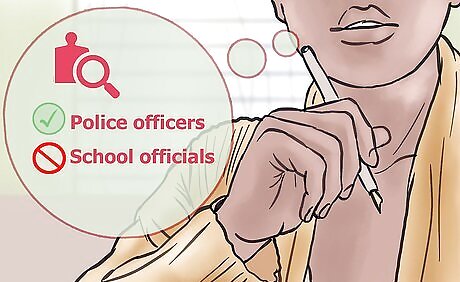
Identify who searched you. The lesser standard of reasonable suspicion only applies to school officials – not to police officers, even if they are employed by your school. If a police officer conducts a search of you or your belongings, they must have a warrant. This applies to "resource officers" as well, even if they are not employed by the school or are considered off duty while working with the school. If someone has a law enforcement badge, they must get a warrant based on sufficient probable cause to conduct a search of you or your belongings. School officials have a lower standard because courts recognize that it would be impractical and potentially dangerous to require them to get a warrant. Teachers and school officials have a substantial need to maintain order and control in the school setting that requires more flexibility. However, this lowered standard doesn't extend to police officers on school grounds.

Talk to witnesses. Get statements from anybody who was present when the search took place, or who has information regarding why the school decided to search you. These statements may assist you in proving the school violated your Fourth Amendment rights. Witness statements can be especially useful if the school official who searched you relies on one reason to justify the search, while another teacher or administrator claims a different reason was used initially. If school officials relied on information from a source, such as a teacher or another student, to justify the search, try to find out who the source was and talk to them as well. You need to verify what they said. For example, suppose a fellow student told the principal that she was in the bathroom and overheard two students talking about smoking marijuana at lunch time. She didn't know who the students were, but she knew they were in her class because they were talking about the test being given that day. If the principal used that information to justify searching all the girls in the class for marijuana, the search generally would violate those students' Fourth Amendment rights. The principal did not have an individualized reasonable suspicion that any one girl in particular had marijuana on her person.
Evaluating the Context

Identify how many students were searched. Generally, a school must have individualized suspicion to search you. This means school authorities cannot search everyone in a class because they heard someone had drugs – they must have a reason to suspect each individual they search. Keep in mind that this does not apply to drug-sniffing dogs, and generally does not apply to locker searches – although locker searches only involve items in plain sight, and school officials cannot open any closed bags or boxes within lockers. The Fourth Amendment generally is designed to protect a reasonable expectation of privacy. Thus, courts have ruled that students don't have a reasonable expectation of privacy in their lockers, since the lockers themselves are owned and provided to them by the school. There also is no reasonable expectation of privacy in the air surrounding your belongings, so drug-sniffing dogs can walk classrooms, hallways, or student parking lots and identify anything in "plain smell." If a drug-sniffing dog alerts to a smell on your belongings or clothing, this provides school officials with the necessary individualized reasonable suspicion to justify a search.
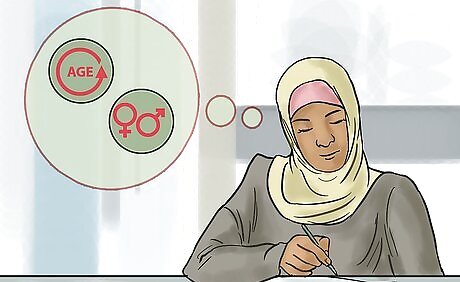
Consider your age and gender. A school search must not be excessively intrusive in light of your age and gender. Some types of searches that would be okay for older students may be unreasonable for younger students. Keep in mind that it all goes back to your reasonable expectation of privacy, and this depends very much on who you are. For example, courts have repeatedly held that teenage girls have a higher reasonable expectation of privacy than other students. These considerations also differ depending on the gender of the school official conducting the search. For example, it typically would be seen as unreasonable for a male teacher to conduct a pat-down search of a female high school student. Most states have laws prohibiting strip searches of students regardless of their age or gender, but strip searches of young children in particular are never appropriate. On the other hand, older students may have heightened expectations of privacy in their belongings relative to young children. For example, a kindergartner who frequently has help from teachers or parents to pack his school bag each day would have a lesser expectation of privacy in that bag than a high school student would.
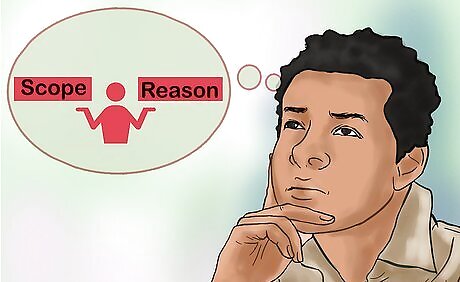
Compare the scope of the search to the reason for the search. For a search by school officials to be reasonable, its scope must be reasonably related to why you were searched and what school officials believed they would find. A search of greater scope might be justified if the school is looking for items such as firearms or other weapons that pose an immediate danger. However, if the safety risk is minimal, an extensive or intrusive search typically violates the student's Fourth Amendment rights. For example, suppose your school prohibits students from having playing cards at school. The principal has a reasonable suspicion that you brought a deck of cards with you to school. This might give her justification to search your locker or your backpack – however, a strip search to locate a deck of cards typically would be considered far outside the realm of reasonableness. Many states have outlawed strip searches of students in school at any time and for any reason. Prohibited strip searches don't necessarily have to involve full nudity. The definition typically includes searches in which the student is asked to remove all clothing but remains in his or her undergarments.
Knowing Your Rights
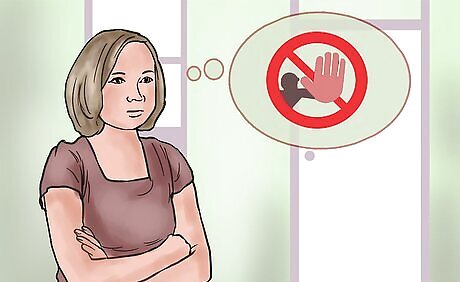
Refuse to consent. School authorities must have reasonable suspicion to search you. However, if you consent to the search, they don't even need that. Your consent means they can search you for no reason at all, so when in doubt, don't consent to the search. Keep in mind that even though you may be pressured, you never have to consent to be searched. School officials may try to convince you to consent because they don't actually have an individualized reasonable suspicion that you are violating school rules. If you consent to a search, you give up any right you may have had to challenge the search later. A search to which you consented can never violate your Fourth Amendment rights, even if you were unaware of the scope or extent of the search before you consented.

Study your school's rules and procedures. Typically any searches will be conducted under an existing policy or procedure outlined in the school's handbook. If that policy or procedure violates students' Fourth Amendment rights, it should be changed. If you don't have a copy of the most up-to-date school handbook, ask a school administrator or guidance counselor for a copy. You also may be able to download a copy from your school's website. Keep in mind that sometimes school handbooks aren't updated as frequently as they ought to be, and your school may have policies or procedures in place that allow searches of students that violate their Fourth Amendment rights. Analyze the procedures and policies carefully using what you've learned about your Fourth Amendment rights in the school setting. If you find a policy or procedure that allows students' constitutional rights to be violated, make a note of it. You also can use the information in your student handbook in the event you become the subject of a search. If school procedures have been carefully designed to protect the Fourth Amendment rights of students, your search may be unreasonable if it violates those policies or procedures. The existence of written procedures establishes what is reasonable, and if a school official violates those procedures you may be able to argue the search was unreasonable solely on the basis that it violated established school protocol.

Talk to a trusted teacher or guidance counselor. If you believe your school violated your Fourth Amendment rights, you need to have an adult on your side to strengthen your voice and help you navigate the system. It also can help to talk to your parents. You may have a lawsuit against the school, but you can't file a lawsuit as a minor without your parents' assistance. There are many nonprofit organizations such as the American Civil Liberties Union that have resources available to help students prove their school violated their Fourth Amendment rights. If you have additional questions or concerns about your school's search procedures, or find it difficult to talk to authority figures at your school about the situation, you might want to look for a local office of one of these nonprofit organizations. You also may be able to contact civil rights organizations by searching for them online and sending an email. When you speak with an adult, show them the written account you made of the search to which you were subjected and any other information you have about the situation so they are better equipped to help you.















Comments
0 comment